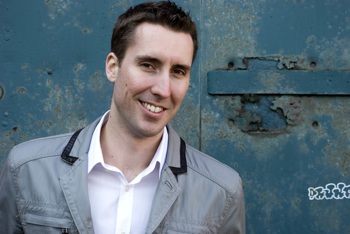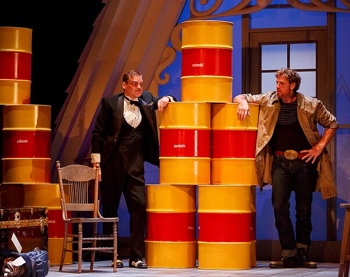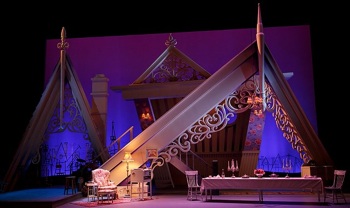Spotlight on Alumni: Jason Hand
 Jason Hand
Jason HandPlease tell us about what you're up to these days, and about some of the most exciting work that you've done since graduating.
I’ve just finished lighting The Arsonists at Canadian Stage. Morris Panych directed, Ken Macdonald did the set, and Charlotte Dean designed the clothing. This past week, I was in a workshop for a production of This (by Melissa James Gibson, directed by Matthew Jocelyn) while also focusing lights on behalf of Alan Brodie for the remount of Christmas Carol at Soulpepper.
This coming week, I’ll be working up a lighting plot for The Tales of Hoffmann which opens at the Edmonton Opera in February and a rough plot for The Amourous Adventures of Anatol at Tarragon. Anatol has the same team as The Arsonists, so I’m really looking forward to that. I also have to start thinking about other two shows that have been back burner, but are starting to draw near.
Somewhere in the middle of all that, lighting designer Robert Thompson was kind enough to name me as one of two of his protégés when he received the 2012 Siminovitch Prize in Theatre.
I’m at the beginning of an exciting year. It’s so carefully and tightly packed that I’ve already organized every week from now until May. Thank heavens for iCal!
 Shawn Wright and Dan Chameroy in The Arsonists at Canadian Stage. Set by Ken MacDonald, Lighting by Jason Hand, Costumes by Charlotte Dean.
Shawn Wright and Dan Chameroy in The Arsonists at Canadian Stage. Set by Ken MacDonald, Lighting by Jason Hand, Costumes by Charlotte Dean.Photo by Bruce Zinger.
What was the most challenging aspect or experience of training/studying at York?
How to balance my calendar. In third year, I was a production manager for the Theatre Department, Technical Director at the Student Center. In my spare time, I was Technical Director for Magic Flute at the Living Arts Center which transferred to the Toronto Center for the Arts. That theatre ended up hiring me as a part-time production manager.
I’m actually not really sure how it all worked. I still have that year’s agenda somewhere (written in pen, before we had iEverythings) and each 15-minute increment was scheduled. Sometimes it worked but a couple of times I did get in over my head. When that happened friends and compassionate colleagues bailed me out. It was an invaluable experience, but I’ll never do it to myself again!
What was your favourite place at York, and why?
I loved the Design Studios. I wasn’t in set design so I was never given a desk in a studio, but I loved checking out what everyone was creating. There were so many exhausted people in those rooms who were somehow managing to turn out such interesting ideas.
Do you have any advice or tips for York students just about to graduate? about to join the job market?
Organize and educate yourself. There are so many skills that you’re going to need. Fortunately, you’re not the first lighting designer/director/actor/other that has started a career in Canada. Reach out to others who are doing what you want to do. Ask if you can spend some time with them in a professional setting: first as a shadow, then maybe as an assistant. Being in the room is the best way to learn, and the easiest way to get a job. I’m regularly amazed at how people will hire who is in front of them, no matter the qualifications, rather than take a chance on a total unknown.
 The Arsonists at Canadian Stage. Set by Ken MacDonald, Lighting by Jason Hand, Costumes by Charlotte Dean.
The Arsonists at Canadian Stage. Set by Ken MacDonald, Lighting by Jason Hand, Costumes by Charlotte Dean.Photo by Bruce Zinger.
If you had the chance to go back and visit your younger self as you were beginning at York, what advice would you give yourself?
Become more active in the Winter’s community. I assumed that I was too busy to participate… it was the classic “I can’t, I’m in theatre” nonsense. Don’t buy into that sentiment. There are plenty of majors that are just as difficult (and many that are even harder) and those students make it work. It can be done and the fun will make it completely worthwhile.
Did connections, friendships, relationships you made at York help you afterward?
I owe my first big gig as Technical Director to York grad Mike Lewandowski. Christine Horne, Matthew Romantini, and Charles Roy gave me my first legitimate design work right out of school. Angie Stillitano helped me get a job as a Technical Director at the Miles Nadal Jewish Community Center and Jason Salvatori frequently hired me as a freelance technician. Without them, I wouldn’t have been able to pay the bills while I started my design career.
Then there were people with whom I had a connection because they were also Yorkies, even though we didn’t go to school together. Elissa Horscroft hired me as an assistant at Stratford. Later, Wendy Greenwood and David Feheley poached me from Stratford and hired me at the Canadian Opera Company. A few years after that, Alistair Hepburn helped me get my foot in the door as a designer at Canadian Stage.
On top of that, my closest friends are my non-theatre friends from York.
So… yes.
What did you learn at York that has been of greatest value?
Through Elizabeth Asselstine, Teresa Przybylski and Shawn Kerwin I learned to appreciate art, architecture and history. Cameron Moore taught me that the actor is at the center of good theatre, and that my job is to support them as they tell the story. In my final year, Liz also taught me that once you get into the theatre, you have to let go of all the paperwork and preplanning. Just work with the director to respond to what’s on stage. The audience will never see your process, only the final product.
What did you NOT get taught at York that you wish you had been taught?
I wish I learned about financial planning and some basic economics. I think that as young artists we get a little to in love with the “I’m not in it for the money” sentiment. While we aren’t artists for the sake of financial reward, it’s important to understand that the Art doesn’t happen without the Money.
There’s the grant writing but you also have to keep your personal finances in order. You have to learn how to keep records, how to prepare for taxes, when to get an HST number, how to decide between an RRSP and a TFSA, when to buy a house (and why!), and how to pick investments. Certainly, you can hire an accountant and a financial advisor later on, but you need to be informed so that you can make wise decisions. When choosing a career where the money isn’t going to be outstanding, I’ve learned that it makes sense to get the most out of every dollar. You may aspire to be a theatre artist, but as a human being you also need life skills like cooking, cleaning, dressing well, etc. Managing your money and running a business is just another required life skill. If you fail to provide for yourself, you won’t be able to practice your craft… and then you won’t be making any art at all.